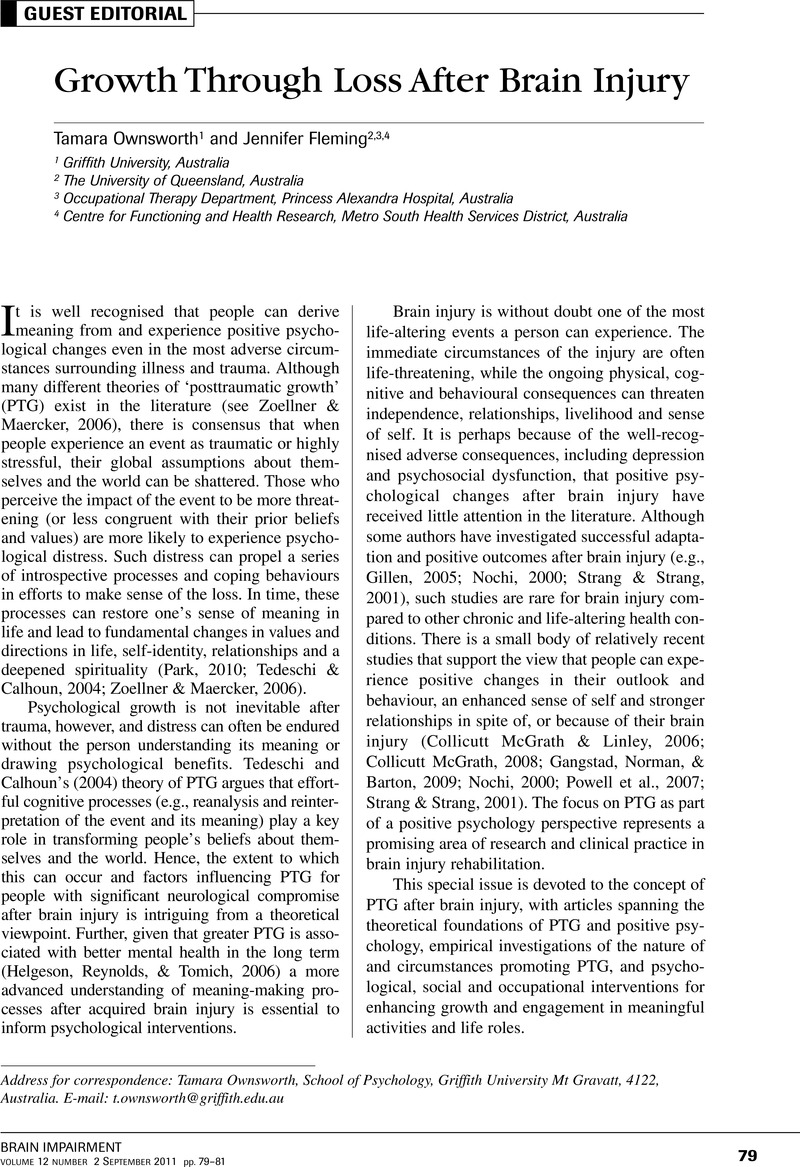Crossref Citations
This article has been cited by the following publications. This list is generated based on data provided by Crossref.
Levack, William M M
Boland, Pauline
Taylor, William J
Siegert, Richard J
Kayes, Nicola M
Fadyl, Joanna K
and
McPherson, Kathryn M
2014.
Establishing a person-centred framework of self-identity after traumatic brain injury: a grounded theory study to inform measure development.
BMJ Open,
Vol. 4,
Issue. 5,
p.
e004630.
Thomas, Emily J.
Levack, William M. M.
and
Taylor, William J.
2014.
Self-Reflective Meaning Making in Troubled Times.
Qualitative Health Research,
Vol. 24,
Issue. 8,
p.
1033.
Walsh, R. Stephen
Fortune, Donal G.
Gallagher, Stephen
and
Muldoon, Orla T.
2014.
Acquired brain injury: combining social psychological and neuropsychological perspectives.
Health Psychology Review,
Vol. 8,
Issue. 4,
p.
458.
Perkins, Alison
2015.
Neuropsychological Rehabilitation of Childhood Brain Injury.
p.
215.
Levasseur, Mélanie
Pigot, Hélène
Couture, Mélanie
Bier, Nathalie
Swaine, Bonnie
Therriault, Pierre-Yves
and
Giroux, Sylvain
2016.
Identifying participation needs of people with acquired brain injury in the development of a collective community smart home.
Disability and Rehabilitation: Assistive Technology,
Vol. 11,
Issue. 8,
p.
636.
Seeto, Erin
Scruby, Kate
and
Greenhill, Tina
2017.
‘Your whole life becomes a recovery’: Experiences of young adults following acquired brain injury.
Counselling Psychology Review,
Vol. 32,
Issue. 4,
p.
39.
Beadle, Elizabeth Jane
Ownsworth, Tamara
Fleming, Jennifer
and
Shum, David H. K.
2020.
The nature of occupational gaps and relationship with mood, psychosocial functioning and self-discrepancy after severe traumatic brain injury.
Disability and Rehabilitation,
Vol. 42,
Issue. 10,
p.
1414.
Roddy, Chantal
Rickard, Nikki
Tamplin, Jeanette
Lee, Young-Eun C
and
Baker, Felicity Anne
2020.
Exploring self-concept, wellbeing and distress in therapeutic songwriting participants following acquired brain injury: A case series analysis.
Neuropsychological Rehabilitation,
Vol. 30,
Issue. 2,
p.
166.
Whiffin, Charlotte J
and
Ellis-Hill, Caroline
2022.
How does a narrative understanding of change in families post brain injury help us to humanise our professional practice?.
Brain Impairment,
Vol. 23,
Issue. 1,
p.
125.
Baseotto, Monica C.
Morris, Paul G.
Gillespie, David C.
and
Trevethan, Ceri T.
2022.
Post-traumatic growth and value-directed living after acquired brain injury.
Neuropsychological Rehabilitation,
Vol. 32,
Issue. 1,
p.
84.
Arroyo, Pamela
Wilkie, Lowri
Davies, Elen
Fisher, Zoe
and
Kemp, Andrew Haddon
2024.
Thriving in the wake of a storm: A systematic qualitative review & meta-synthesis on facilitating post-traumatic growth in patients living with Acquired Brain Injury.
Neuropsychological Rehabilitation,
p.
1.
Versace, J.
Tazrin, S.
O’Connor, E.
Sekibo, J.
Morey, E.
Kasinopoulou, A.
O’Donoghue, D.
and
Simblett, S.K.
2024.
The role of spirituality and identity formation in personal recovery from traumatic brain injury: A qualitative analysis through the personal experiences of survivors.
Neuropsychological Rehabilitation,
Vol. 34,
Issue. 8,
p.
1110.



